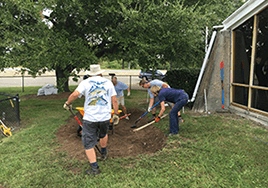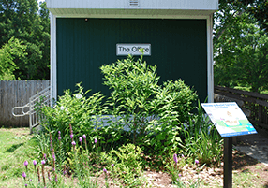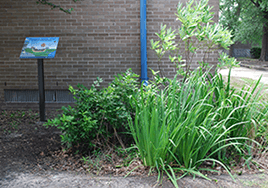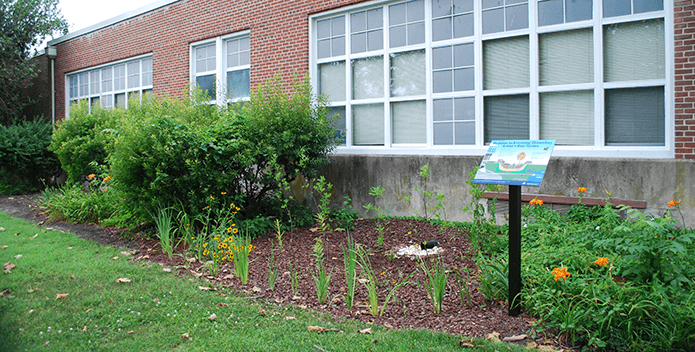Rain gardens do the Bay a huge service by catching rainwater, which slows and filters polluted runoff. When rain falls on hard surfaces—like buildings and parking lots—it cannot soak into the ground naturally. This excess water, called runoff, erodes soil and picks up sediment, pesticides, fertilizers, and other pollutants it encounters along the way. Eventually this runoff enters a storm drain and flows into a nearby creek or river.

A rain garden is installed at Air Power Park in Hampton, Virginia.
Kenny Fletcher
Rain gardens contain plants that slow down this runoff and absorb or trap harmful pollutants. Over time, rain gardens fill out and flourish, creating a beautiful spot for the community that also restores wildlife habitat by attracting creatures such as insects, butterflies, toads, and predators like hawks.
In late 2016, CBF staff and volunteers planted rain gardens at Air Power Park and at Bluebird Gap Farm, along with three others in Hampton. Just look at the growth since then. This goes to show that if you let it go, mother nature will take it back—quickly!

Bluebird Gap Farm rain garden has grown quite a lot in the 18 months after completion.
Julie Luecke
CBF also facilitated the planting of three rain gardens in Norfolk in early 2011, like this one at Old Dominion University's boathouse. It's come along a lot over the years—the hardy native wax myrtle is reaching for the sky!
Creating a rain garden also helps build environmental stewardship in students. Michele Ferrel, a fourth grade science teacher at Spratley Gifted Center in Hampton, uses the rain garden in front of the school to teach about Virginia resources, plants, and watersheds. "It is very powerful to be able to show the students a rain garden in action on our school grounds," she said.

The rain garden at Spratley Gifted Center is being used as a learning tool to teach about Virginia resources, plants, and watersheds.
Julie Luecke
In addition to education, a rain garden can foster a sense of community, said Linda White at First Baptist Church—Hampton. "Since the garden is near the entrance to our chapel that is 150 years old, I want it to look nice," she said. "And while I'm out weeding, sometimes police officers or members of city council stop by and ask about it. Sometimes even strangers walking down the street will stop by. I love that it brings people together and toward our church."
If you see one of the many rain gardens CBF has helped plant around the watershed you'll be sure to learn in the process!
Julie Luecke, CBF Hampton Roads Intern
Issues in this Post
Runoff Pollution Community CBF in Virginia Hampton Roads Office Virginia Office, Richmond



